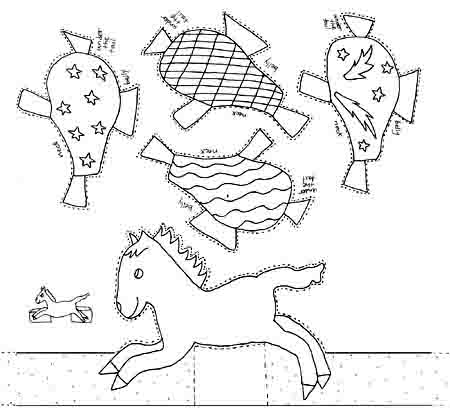Horse
Facts.
Horses belong
to an order of mammals, Equus caballus, with odd-toed hoofs
and teeth that are modified for chewing. They have short hair,
a long mane, and a long tail. The
horse family includes more than 200 breeds of domestic horse,
zebras, and asses all believed to be descendants of Przewalski's
horse, the only truly wild horse in the world today.
All members
of the horse family feed on plant matter. They usually graze all
day long on grass rather than leaves but individual species may
also eat herbs, buds, fruit, bulbs, roots, branches, foliage,
shrubby trees, hay, and a mixture of oats, barley, corn, and bran.
Speed is the main defense of all horse species. They communicate
through a soft nickering to a loud whinny and may snort and squeal
as they fight. Their ears and mouth reveal their mood. Ears strained
forward usually indicate fear. Alert and upright, with mouth slightly
open, is a friendly greeting. Pressed back, possibly with the
mouth open, is a threat gesture. A horse shows submission by holding
down its ears while making nibbling movements with its mouth.
Horses shed their thick coats of hair in the spring. They can
see forward, sideways, and even backwards because their eyes are
on the side of their heads. They have such a well-developed sense
of hearing and smell that they know something is near before they
can see it.
Until it is
a year old, a horse is called a foal. A female horse is
called a mare. A male horse that is used in breeding is
called a stallion. A
young stallion is a colt and a young mare is a filly.
A gelding
is a male horse that has been castrated and cannot be used for
breeding. A year old horse is called a yearling. A horse
is not considered full grown until it is five years old.
Members of
the horse family are herd animals. When isolated or alone, a horse
often becomes depressed. In the wild, horses usually live in herds
and are led by a dominant stallion (male) who fights off rival
males and mates with his mares (females). Mustangs are wild horses.
Horses have been domesticated since ancient times by man for work
and for pleasure.
Top
![]()
